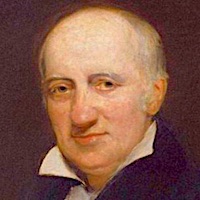

Tao Te Ching

William Godwin
1756 – 1836 CE
Provocative and influential social, political, and literary critic
Mary Shelley’s father, married to pioneering feminist Mary Wollstonecraft, journalist, philosopher, publisher, translator, and author; Godwin became the first to promote utilitarianism and modern anarchism. He attacked aristocratic privilege, advocated the abolition of marriage, wrote numerous novels, and became a major influence on British literature and culture. His views on progress, life extension, and human perfectibility gave inspiration for his daughter’s novel, Frankenstein. He opposed Malthus, became a literary influence on Dickens and Poe, a political influence on Peter Kropotkin, libertarianism, and communism.
Eras
Chinese
Qing dynasty (1644 – 1912 CE)Sources
Enquiry Concerning Political Justice
Unlisted Sources
An Inquiry Concerning Political Justice (1793)
Sketches of History, 1784
Quotes by William Godwin (20 quotes)
“Whenever government assumes to deliver us from the trouble of thinking for ourselves, the only consequences it produces are those of torpor... Government by its very nature counteracts the improvement of original mind,”
from Enquiry Concerning Political Justice
Comments: Click to comment
“Democracy restores to man a consciousness of his value, teaches him by the removal of authority and oppression to listen to the dictates of reason, gives him confidence to treat all other men as his fellow human beings, and induces him to regard them no loner as enemies against whom to be upon his guard, but as brethren whom it comes him to assist.”
from Enquiry Concerning Political Justice
Comments: Click to comment
“Literature, taken in all its bearings, forms the grand line of demarcation between the human and the animal kingdoms… He that loves reading has everything within his reach.”
from Enquiry Concerning Political Justice
Comments: Click to comment
“If he who employs coercion against me could mold me to his purposes by argument, no doubt he would. He pretends to punish me because his argument is strong; but he really punishes me because his argument is weak.”
from Enquiry Concerning Political Justice
Comments: Click to comment
“Revolutions are the product of passion, not of sober and tranquil reason… Revolution is engendered by an indignation with tyranny, yet is itself pregnant with tyranny.”
Comments: Click to comment
“Make men wise, and by that very operation you make them free. Civil liberty follows as a consequence of this; no usurped power can stand against the artillery of wisdom.”
from Enquiry Concerning Political Justice
Comments: Click to comment
“The first duty of man is to take none of the principles of conduct upon trust; to do nothing without a clear and individual conviction that it is right to be done.”
from Enquiry Concerning Political Justice
Comments: Click to comment
“The cause of justice is the cause of humanity. Its advocates should overflow with universal good will. We should love this cause, for it conduces to the general happiness of mankind.”
from Enquiry Concerning Political Justice
Comments: Click to comment
“It is absurd to expect the inclinations and wishes of two human beings to coincide, through any long period of time. To oblige them to act and live together is to subject them to some inevitable potion of thwarting, bickering, and unhappiness.”
from Enquiry Concerning Political Justice
Comments: Click to comment
“One of the prerogatives by which man is eminently distinguished from all other living beings inhabiting this globe of earth, consists in the gift of reason.”
from Enquiry Concerning Political Justice
Comments: Click to comment
“All education is despotism… Go there; do that; read; write; rise; lie down… teachers, politics and modes of government poison our minds before we can resist, or so much as suspect their malignity. They deprive us of our vitality”
from Enquiry Concerning Political Justice
Comments: Click to comment
“Law is an institution with the most pernicious tendency. Once begun, it can never be brought to a close because no new action is ever the same as any other action. As new cases occur, the law is perpetually found deficient. It is therefore perpetually necessary to make new laws.”
from Enquiry Concerning Political Justice
Comments: Click to comment
“We retail and mangle truth. So that we may deceive others with a tranquil conscience, we begin with deceiving ourselves.”
from Enquiry Concerning Political Justice
Comments: Click to comment
“Society [culture] is produced by our wants, and government by our wickedness. Society is a blessing; government even in its best state a necessary evil, a tyranny; and because—even in its best state—an evil, we should have as little of it as the general peace of human society will permit.”
from Enquiry Concerning Political Justice
Comments: Click to comment
“God Himself has no right to be a tyrant.”
from Sketches of History, 1784
Comments: Click to comment
“Incessant change, everlasting innovation seem to be dictated by the true interests of mankind. But government is the perpetual enemy of change.”
from Enquiry Concerning Political Justice
Comments: Click to comment
“Opinion is the castle, or rather the temple of human nature; and, if it be polluted, there is no longer any thing sacred or venerable”
from An Inquiry Concerning Political Justice (1793)
Comments: Click to comment
“The first duty of men is to take none of the principles of conduct upon trust; to do nothing without a clear and individual conviction that it is the right to be done.”
from An Inquiry Concerning Political Justice (1793)
Comments: Click to comment
“The pretense of collective wisdom is the most palpable of all impostures.”
from An Inquiry Concerning Political Justice (1793)
Comments: Click to comment
“The wise man is satisfied with nothing.”
from An Inquiry Concerning Political Justice (1793)
Comments: Click to comment
Comments (0)